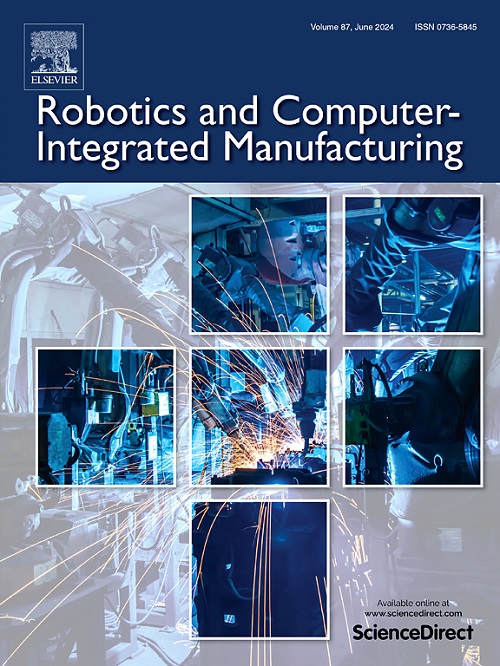A point cloud registration algorithm considering multi-allowance constraints for robotic milling of complex parts
IF 9.1
1区 计算机科学
Q1 COMPUTER SCIENCE, INTERDISCIPLINARY APPLICATIONS
引用次数: 0
Abstract
Adaptive allocation of the machining allowance is the crucial factor in ensuring the machining accuracy of complex parts. In this work, we present a multi-objective constraint registration method. First, an improved point cloud segmentation method is developed by combining point search and region data expansion algorithms. Afterward, the machining allowance is accurately calculated by using statistical analysis and multi-point sampling strategies to enhance the calculation accuracy of the point-to-triangular patch distance. Finally, a registration objective function is established by considering the allowance constraints of various geometric regions of the workpiece, and the particle swarm optimization algorithm is used to solve the optimum solution. The proposed multi-constraint registration method realizes optimal allocation of the allowance in different regions, which offers a reference coordinate system for the robotic milling of complex free-formed parts. Simulation and experimental results reveal that the developed method satisfies the minimum registration error while ensuring the allocation of allowance in the robotic milling of the casing cavity compared with other methods.
考虑多余量约束的点云注册算法,用于复杂零件的机器人铣削
加工余量的自适应分配是确保复杂零件加工精度的关键因素。在这项工作中,我们提出了一种多目标约束注册方法。首先,结合点搜索和区域数据扩展算法,开发了一种改进的点云分割方法。然后,利用统计分析和多点采样策略精确计算加工余量,以提高点到三角形补丁距离的计算精度。最后,考虑工件各几何区域的余量约束,建立注册目标函数,并采用粒子群优化算法求解最优解。所提出的多约束注册方法实现了不同区域的余量优化分配,为复杂自由曲面零件的机器人铣削提供了参考坐标系。仿真和实验结果表明,与其他方法相比,所开发的方法在确保机器人铣削机壳型腔时的余量分配的同时,满足了最小注册误差的要求。
本文章由计算机程序翻译,如有差异,请以英文原文为准。
求助全文
约1分钟内获得全文
求助全文
来源期刊
CiteScore
24.10
自引率
13.50%
发文量
160
审稿时长
50 days
期刊介绍:
The journal, Robotics and Computer-Integrated Manufacturing, focuses on sharing research applications that contribute to the development of new or enhanced robotics, manufacturing technologies, and innovative manufacturing strategies that are relevant to industry. Papers that combine theory and experimental validation are preferred, while review papers on current robotics and manufacturing issues are also considered. However, papers on traditional machining processes, modeling and simulation, supply chain management, and resource optimization are generally not within the scope of the journal, as there are more appropriate journals for these topics. Similarly, papers that are overly theoretical or mathematical will be directed to other suitable journals. The journal welcomes original papers in areas such as industrial robotics, human-robot collaboration in manufacturing, cloud-based manufacturing, cyber-physical production systems, big data analytics in manufacturing, smart mechatronics, machine learning, adaptive and sustainable manufacturing, and other fields involving unique manufacturing technologies.

 求助内容:
求助内容: 应助结果提醒方式:
应助结果提醒方式:


